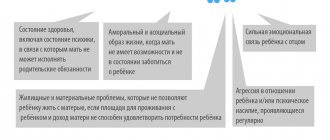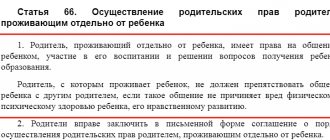Determining the order of communication with a child is a problem for many parents who, due to life circumstances, have decided that further life together as one family is impossible.
Our family law attorney will help you understand the schedule of communication with your child, draw up a statement to determine the order of communication with the child, and represent your interests in court.
The procedure for determining the order of communication with a child
- An option for peaceful resolution of the conflict, when each parent understands that the rights to communicate with the child are equal and it is necessary to negotiate. Drawing up an agreement to determine the procedure for communication with the child in writing or negotiations without drawing up a document leads to the protection of the rights of each parent to participate in the life of the child. Everyone benefits from this decision, especially the rights and interests of the child, who receives warmth and care from both parents, are protected. Determining the order of communication with the child of a separate parent in this option is also beneficial for the parties who spend a minimum amount of time on the issue.
- If people who were once close to each other fail to reach an agreement voluntarily, a trial becomes necessary. Our family lawyer has more than once encountered questions from clients: what to do if the child is not allowed to go with the other parent, and sometimes they are not even allowed to see each other. This conflict between parents especially arises after resolving the dispute over determining the child’s place of residence (you can read our proposal on this issue in more detail at the link). The way out of this situation is a statement of claim to determine the order of communication with the child. During the trial, the issue of the time of meetings, as well as the order of their conduct, is decided.
What rights does each parent have after a divorce?
According to the law (Article No. 66 of the RF IC), both father and mother have equal rights in their desire to take part in raising a child after divorce. If one of the parents changes their place of residence, this should not become an obstacle to meetings and communication. Neither the father nor the mother has the right to prevent minor children from communicating with one of them, unless there are compelling reasons for this - harm to the psychological or physical condition of the minor.
The schedule of meetings between one of the parents and the child after a divorce may be determined by a written settlement agreement. The decision regarding communication between mom or dad and the child can be determined by the court at the request of one of them. If the terms of the written agreement are violated, then, if there is evidence, the person who ignored the jointly drawn up agreement bears legal responsibility.
The court when deciding the issue of communication with the child
When resolving an issue in court, the following are taken into account:
- Legal capacity of a minor. The order in which a child communicates with his father is directly determined by the age of the little person. Whenever a case involves an infant, the judge usually rejects the father's request to take the baby away from the mother. In this case, the father will be able to see the baby only with the nursing mother. However, the older the infant, the more likely the parent is to have unsupervised visits. When the child switches to a regular diet, he can sometimes live with his dad. The facts are that the age of the child greatly influences the chances of the next of kin to win a claim to determine the order of communication with the child, when the presence of the ex-wife is not necessary.
- Presence of diseases in the baby. When examining an application to determine the order of communication with a child, the judge very carefully examines the issue of the child’s well-being in order to make sure that both parents are responsible.
- How suitable is the home for the child? When a petition is being considered for the offspring to live with the other parent for some time, the court will examine the housing situation. The cleanliness of all rooms and the fact that there are suitable conditions for the baby to be in this room are important. This is the process of determining the order of communication of children with their father, with their mother, or the transfer of offspring into guardianship.
- The usual schedule for the baby. When the child already goes to different educational institutions, and the second parent wants visits on weekdays, he must do everything so that the child continues to live in his usual schedule. Willingness to comply with the schedule will not direct disputes about determining the order of communication with the child in a positive direction; the judge’s answer can be anything.
- Distance between guardians' homes. Very often, parents live in different parts of the city, and daily trips over long distances negatively affect the child’s mental mood. In such a situation, the determination of the order of communication with the child in court will be based on the latter’s views on the situation.
- The influence of raising loved ones on the psyche of a growing person. Objections to determining the order of communication with the child are dealt with when the father or mother was absent for the child for a long time or negatively influenced his growing up. In this case, meetings between the parent and the child are impossible without the presence of a guardian until the minor is completely accustomed to his presence.
IMPORTANT: the jurisdiction of a dispute regarding the order of communication with children: for these disputes, the general rules on jurisdiction apply: “a claim to determine the order of communication with a child is brought to the court at the place of residence of the defendant.” Most often, the application is submitted at the place of registration of the defendant or at his place of residence.
Mistakes of co-parenting
One of the parents is always offended by the other. Sometimes the hostility is mutual. However, children should not suffer from this.
The most common co-parenting mistakes:
- Obstruction of communication.
- Insulting a parent in front of their children. You shouldn’t talk to other people about your ex-spouse from a bad perspective in the presence of a child.
- Clarification of relations with a former spouse (wife) in front of children.
- Using your child as a way to get back to your ex(s).
- Inability to compromise when it comes to changes in the children's communication schedule with the parent.
- Replacing communication with buying toys and other things.
- Using a child as a courier or to ask your ex-husband or wife for something.
- Forcing a minor to take his side.
State duty when filing a claim to determine the order of communication with a child
Plaintiffs in such claims are exempt from paying state fees. “Review of the practice of courts resolving disputes related to the upbringing of children” explained the following on this issue: “the requirement to pay a state fee in disputes related to the upbringing of children is illegal, since these disputes relate to cases of protecting the rights of the child and are not subject to fees, which follows from the provisions of clause 15, part 1, art. 333.36 Tax Code of the Russian Federation, clause 2 of Art. 23 of the Federal Law of July 24, 1998 N 124-FZ “On the basic guarantees of the rights of the child in the Russian Federation.”
Taking into account the child’s opinion when determining the child’s place of residence
Article 57 of the Family Code of the Russian Federation establishes that a child has the right to express his opinion when deciding in the family any issue affecting his interests, as well as to be heard during any judicial or administrative proceedings. Taking into account the opinion of a child who has reached the age of ten is mandatory, except in cases where this is contrary to his interests.
The specifics of the application of this norm are explained in paragraph 20 of the Resolution of the Plenum of the Supreme Court of the Russian Federation dated May 27, 1998 No. 10 “On the application of legislation by courts in resolving disputes related to the upbringing of children.”
This paragraph of the Plenum Resolution states that before interviewing a minor in court, the opinion of the guardianship and trusteeship authority should be ascertained as to whether his presence in court will have an adverse effect on the child.
However, paragraph 4 of the Resolution of the Plenum of the Supreme Court of the Russian Federation dated April 20, 2006 No. 8 “On the application of legislation by courts when considering cases of adoption of children” states that when deciding the issue of the need to summon a minor aged ten to fourteen years old, the judge should proceed from the provisions of Article 57 of the RF IC, according to which the child has the right to be heard during any trial affecting his interests. If there are grounds to believe that the presence of a child in court may have an adverse effect on him, the court ascertains the opinion of the guardianship and trusteeship authority on this matter.
The “Review of the practice of courts resolving disputes related to raising children”, approved by the Presidium of the Supreme Court of the Russian Federation on July 20, 2011, states that one should be guided by paragraph 4 of the Resolution of the Plenum of the Supreme Court of the Russian Federation dated April 20, 2006 No. 8 “On the application of legislation by courts when considering cases of adoption of children."
The child must be interviewed taking into account his age and development in the presence of a teacher. The survey should be carried out in an environment that excludes the influence of interested parties, that is, without parents.
The court must find out what influence his parents or other interested parties had on him and whether his opinion is a consequence of such influence. Is the child aware of his own interests, how does he justify them, etc.
The child’s opinion is taken into account, but is not decisive.
Communication schedule between father or mother and child
- It is necessary to determine as clearly as possible the time of meeting with the child. Please remember that this time period will be binding on both parents. You should not declare and ask for time that will obviously be impossible for you to do. Violation of the schedule may be regarded as a violation of the rights of the child and subject to review, due to the presence of these circumstances;
- do not forget that you, as a parent, have not only parental rights in relation to your child, but also responsibilities for his maintenance. In this regard, pay alimony on time and do not allow your ex-wife to collect alimony through forced judicial proceedings. The court may regard this act as negative behavior of the parent and limit it in the communication schedule (this conclusion is confirmed by the practice of determining the order of communication with the child);
- When filing claims to determine the order of communication with the child, provide for possible meetings on holidays and weekends. According to the law, parents have equal rights, so it is quite logical to require alternating meeting days on special dates. For example, this applies to the birthday of a minor, New Year, March 8 and other holidays that are significant to you;
- It is important to remember that the presence or absence of the second parent during the meeting with the child is the main issue of the process. Every parent who asks to let their child go to amusement parks or children's events wants to be left alone with him. And the other party to the process often insists on meetings in her presence and under her control, which is very inconvenient given the breakdown of relations. We will help you justify your position in court;
- This type of dispute about children will take place with the mandatory participation of the guardianship and trusteeship authority. To give an opinion on the case, it will be important for the social service worker to understand the characteristics of the individual, and therefore it is necessary to prepare for the trial fully and with understanding. During your consultation, our lawyer will provide a broader list of recommendations on this issue.
Read about our participation in the case and the procedure for communicating with the grandmother’s child at the link. The interests of the grandmother were fully protected, and the arguments of the child’s father were recognized as far-fetched and untenable.
The help of a lawyer is the key to successfully protecting your child!
When resolving disputes about children, one should be guided not by emotions generated by hostility towards the ex-spouse, but by common sense and the desire to preserve a happy childhood for the child. Only a cool head and understanding of the mechanisms of judicial protection will help you defend your right to raise your child and achieve justice.
Lawyers at ICPI “Planet of Law” are ready to provide any legal assistance in disputes about children of any complexity, from consultation to comprehensive case management. You should not risk your child’s future; inaction and conflict with your ex-spouse can cause irreparable harm to the child’s psyche. Call +.
As a rule, disputes between parents about the order of communication with the child arise after the divorce. In the vast majority of cases, after the parents' family relationship ends, the child remains to live with his mother. It is quite rare for the child’s father to be able to prove in court that it is in the child’s interests that he should be allowed to live with the father, who has living quarters and a considerable income, which the mother does not have. Evidence that the father will surround the child with parental love, care and warmth will also be reflected in the case materials. However, this will not be enough for the court. To convince the court that the child would be better off with his father and not with his mother, the father must provide evidence that the mother abuses alcohol, or uses drugs, or has mental disabilities, has a criminal record, is a member of a sect, etc. Otherwise, the chances of winning in court tend to zero.
After the place of residence of the child is determined to be the place of residence of his mother, the separated father retains the same rights to communicate (meet) with the child as before the divorce. However, in practice, for one reason or another, mothers begin to create obstacles in this. A parent who is deprived of the opportunity to freely see his child can only file a claim in court to determine the order of communication with the child (such a claim is also called “to determine the order of meetings with the child”).
Parents arguing in court offer their own options for communicating with their child. A father who does not live with the child usually asks for more time for such communication, asks the court to determine the procedure according to which he will be able to freely not only meet with the child, but also travel with him during vacation outside the locality, as well as abroad . Mom objects; her option is aimed at minimizing the time the child communicates with her ex-spouse.
However, it must be said that cases of concluding a settlement agreement are not uncommon.
Disputes regarding the determination of the order of communication (meetings) with the child are resolved by the court with the participation of the guardianship and trusteeship authority at the request of the parents (one of them).
The Supreme Court of the Russian Federation on determining the procedure for communicating with a child
It is necessary to take into account the explanations given by the Supreme Court of the Russian Federation in paragraph 8 of the Resolution of the Plenum of the Supreme Court of the Russian Federation dated May 27, 1998 N 10 “On the application of legislation by courts in resolving disputes related to the upbringing of children”:
“... In accordance with paragraph 2 of Art. 66 of the RF IC, parents have the right to enter into a written agreement on the procedure for the exercise of parental rights by a parent living separately from the child. If the parents cannot come to an agreement, the dispute that has arisen is resolved by the court at the request of the parents or one of them with the participation of the guardianship and trusteeship authority.
Based on the right of a parent living separately from the child to communicate with him, as well as the need to protect the rights and interests of a minor when communicating with this parent, the court, taking into account the circumstances of each specific case, should determine the procedure for such communication (time, place, duration of communication and etc.), setting it out in the operative part of the decision.
When determining the order of communication between a parent and a child, the child’s age, state of health, attachment to each parent and other circumstances that can affect the child’s physical and mental health and moral development are taken into account.
In exceptional cases, when communication between a child and a parent living separately may cause harm to the child, the court, based on paragraph 1 of Art. 65 of the RF IC, which does not allow the exercise of parental rights to the detriment of the physical and mental health of children and their moral development, this parent has the right to refuse to satisfy the claim to determine the procedure for his participation in the upbringing of the child, setting out the reasons for the decision made.”
As explained in the “Review of Legislation and Judicial Practice of the Supreme Court of the Russian Federation for the first quarter of 2003,” cases on claims of a separately living parent to determine the order of communication with a child, to restore the parental rights of a citizen deprived of parental rights, to cancel an adoption, as well as Cases on claims to determine the place of residence of a child, to place a child in foster care, to the procedure for exercising parental rights, to remove obstacles in communication with a child are subject to consideration in the district court, since they affect the rights and interests of children.
Not only the parents have the right to communicate with the child. According to Art. 67 of the Family Code of the Russian Federation, grandparents, brothers, sisters and other relatives also have the right to communicate with the child.
See also on this topic Review of the practice of courts resolving disputes related to raising children (Approved by the Presidium of the Supreme Court of the Russian Federation on July 20, 2011, in February 2012 posted on the official website of the Supreme Court of the Russian Federation)
Statement of claim to determine the order of communication with a child
We recommend the following examples of claims to court:
Sample statement of claim to determine the order of communication with a child
Statement of claim to determine the order of communication with a child
We also recommend:
“Determination of the child’s place of residence. Claims, agreements . Procedure for exercising parental rights”, where sample agreements about the child are posted:
- Agreement on the child’s place of residence and the procedure for exercising parental rights;
- Agreement on determining the child’s place of residence and the procedure for exercising parental rights;
- Agreement to determine the child’s place of residence. Sample.
Judicial practice of determining the order of communication with a child
So, let’s give some examples from judicial practice that may help parents who are faced with the above problem formulate claims (propose their own procedure for communicating with the child), or, conversely, indicate in the response to the claim the reasons why meetings (too frequent meetings) with a non-resident parents are capable of causing harm to the child (psychological trauma).
1. The procedure for communication between a parent living separately and a child is established in the interests of the minor. Based on the interests of a young child, the judicial panel justifiably made a change in the order of communication between the father and him and, in fact, preserved the order of such communication previously determined by the parents themselves - in the presence of the child’s mother
The parties, having divorced, have a 3-year-old son, K., who, on the basis of an agreement concluded between the parents on the child’s place of residence and the procedure for exercising parental rights, is raised by his mother.
D. filed a lawsuit to determine the order of communication with his son, citing the fact that the defendant was preventing him from meeting the child and the term of the above-mentioned agreement had expired.
By the decision of the district court, the claims were partially satisfied, and the procedure for communication between D. and his son in the absence of the defendant for three times a week at the applicant’s place of residence was determined.
By the ruling of the judicial panel for civil cases of the Kirov Regional Court dated 02/03/2009, the decision of the district court was changed and it was decided that meetings between the father and the child should take place in the presence of the mother.
In the supervisory appeal, D., referring to the incorrect application of substantive law, asked to uphold the decision of the trial court.
The complaint was rejected for the following reasons.
In accordance with Part 1 of Art. 66 of the Family Code of the Russian Federation (hereinafter referred to as the Family Code of the Russian Federation), a parent living separately from the child has the right to communicate with the child, participate in his upbringing and resolve issues regarding the child’s education.
As explained in paragraph 8 of the resolution of the Plenum of the Supreme Court of the Russian Federation No. 10 of May 27, 1998 (as amended on February 6, 2007) “On the application of legislation by courts in resolving disputes related to the upbringing of children,” when determining the order of communication between a parent and a child, they are taken into account the age of the child, his state of health, attachment to each of the parents and other circumstances that can have an impact on the physical and mental health of the child, on his moral development.
In this case, the changes made by the cassation instance to the order of communication between the plaintiff and his minor son are consistent with the current family legislation, law enforcement practice and the evidence available in the case.
From the case materials it follows that the former spouses live separately after the divorce and have normal living conditions. There are complex relationships between them regarding the participation of the estranged father in raising the child. In this regard, they entered into an agreement on the place of residence of their son and on the procedure for the exercise of D.’s parental rights. The spouses decided that the young son would live with his mother, in whose presence the plaintiff could communicate with the son.
According to the conclusions of the educational psychologist and social teacher available in the case, young K.’s development meets the age criteria, however, against the background of unfavorable family relationships and age, he is emotionally unstable. In relation to his parents, he is more attached to his mother. Considering this circumstance and age (at the time of the examination the child was 3 years 2 months and 3 years 3 months), it is recommended that the father communicate with the child in the presence of the mother.
The above circumstances were not fully taken into account by the district court, in connection with which the judicial panel, based on the interests of the young child, justifiably made a change in the order of communication between the father and him and, in fact, preserved the order of such communication previously determined by the parents themselves - in the presence of the child’s mother.
In addition, it should be borne in mind that by virtue of the law, the procedure for the participation of a separately living parent in raising a child may subsequently be subject to adjustment in the event of a change in the living conditions of any of the parents, changes in the circumstances determining the conditions for raising the child, in order to best take into account the interests of the minor and his parents (Review of judicial practice on supervisory review of civil cases by the Kirov Regional Court for 2009, dated 08/19/2010).
2. Due to the child’s young age, the order of meetings between the father who does not live with the child is determined in the presence of the child’s mother (during the child’s walk near the defendant’s house)
“... taking into account the specific circumstances of the case, as well as the child’s young age, his attachment to his mother, the court finds it necessary to refuse the plaintiff’s request to provide the plaintiff with the opportunity to pick up the child for the entire day off from 09-00 to 20-00 hours, to oblige the defendant to provide the plaintiff with the opportunity to if he has the desire and opportunity to spend a vacation with his son for at least 2 weeks a year, for which he undertakes to draw up all the necessary documents.
Partially satisfying the claims, the court decided to establish the following procedure for communication with the son, born on July 13, 2007:
LINEN. meets with his son on Tuesday and Thursday from 18:30 to 19:30, on Sunday from 10:00 to 12:00 in the presence of L.M.S.’s mother. while the child was walking near the house of the defendant L.M.S. at the address: ..." (Decision of the Frunzensky District Court of Vladimir dated September 9, 2009).
3. The court, when determining the order of communication with the child, did not motivate its conclusions. From the inspection report of living conditions it follows that the child’s father does not have the conditions for the child to spend the night in the specified residential premises
Canceling the court’s decision, the judicial panel indicated the following: “... When filing a claim in court, D.S. did not indicate any period during which he asked to establish a procedure for communicating with the child. However, the court determined the procedure for communication only until June 29, 2011, that is, only for the next year and a half, and did not motivate its decision in this regard.
In addition, the court of first instance determined in the operative part of the decision that the plaintiff must return the child to the mother at 18:00 by June 24, 2010, but did not indicate that this should happen on the same day.
Also in the case materials there are contradictory documents presented by the guardianship and trusteeship authority, which indicate different addresses where the plaintiff lives. Even if we consider it established that the plaintiff’s place of residence is the address: Nalchik, st. ..., ... sq...., it must be borne in mind that D.S. lives in this one-room apartment with his partner Yu.O. From the inspection report dated October 20, 2009, on case sheet 63, it is clear that in this one room there are: a chest of drawers, upholstered furniture, a wall, a coffee table, a color TV and a computer. The apartment has neither a child's bed nor a bed for adults and the only sleeping place is a sofa included in the upholstered furniture. The court of first instance did not give any assessment of these circumstances and did not motivate its conclusions about how the court assumed it was possible for the child to spend the night with his father and Yu.O. (Cassation ruling of the Judicial Collegium for Civil Cases of the Supreme Court of the Kabardino-Balkarian Republic dated December 16, 2009).
4. When the court determines the procedure for the exercise of rights by a parent living separately from the child, the time for communication with the child is determined taking into account the age of the child, the place of residence of the parties, the work schedule of the parties
“Given his age and the long distance, the weekly trips of a minor, according to the court, can harm the child’s health. Therefore, the court agreed with the procedure proposed by the representative of the guardianship and trusteeship department for communication between the plaintiff and his son at his place of residence: twice a month from 10:00 a.m. on Saturday to 5:00 p.m. on Sunday. The plaintiff will pick up and bring the child himself. From the defendant’s testimony it follows that the boy loves to drive a car and does not get carsick on the road. When making the decision, the court also took into account that frequent trips at night in the winter can also pose a threat to the life and health of the child...”
In another case , the court stated: “.. when determining the possibility of creating conditions for the child’s upbringing and development, the court took into account that in material and housing terms the situation of the parties is equal. However, significant changes have now occurred in the life of a minor. He lives in a new family with his mother and her husband, with whom he has developed a warm relationship; the child calls the defendant’s husband dad. The boy attends kindergarten, he has established a daily routine, and has made new friends. In the urban settlement ... lives by his grandfather and other relatives who love him very much. The court took into account the age of the child, he is only 5 years old, and the annual long-distance moves to the father’s place of residence (in Kirov) for such a long period of time (during the father’s vacation), and communication with the father in the absence of the mother and other relatives, to whom the child is very attached, can negatively affect the physical and mental health of the child. The plaintiff did not provide the court with evidence of the existence of such exceptional circumstances that would allow the separation of the young child Galimardanov A.A. with his mother during the plaintiff's vacation.
The court ordered not to interfere with communication with the child, indicating that “the child’s age is 1 year 3 months, the plaintiff has never been left alone with the child, and has no skills in caring for a young child. By its decision, the court imposed an obligation on the defendant not to interfere with the plaintiff’s communication with the child – her daughter. And he established a procedure for the plaintiff to communicate with his young daughter every Saturday evening from 18:00 to 20:00 at the defendant’s place of residence in the presence of his mother or grandmother. At the same time, he recognized the right of the plaintiff and defendant, after the expiration of the transition period, when the child gets used to his father, to voluntarily or in court determine a different order of communication. (Aznakaevsky City Court of the Republic of Tatarstan - Generalization of judicial practice in considering disputes related to raising children for 2010)
5. The court’s decision to determine the order of communication with the child was left unchanged (once a week on weekdays, once on Sunday in the presence of the mother, by agreement - without her presence)
The court determined the following procedure for communication with a minor son born in 2003:
- on weekdays once a week, on Wednesday from 17:00 to 20:00, every Sunday of the month from 11:00 to 15:00 in the presence and place in agreement with the child’s mother; - in the summer at any time in agreement with the child’s mother, with the possibility of walking with the child in the absence of his mother, but in agreement with her on the walks themselves and their location; - when the child reaches the age of 10 years - according to the specified schedule, taking into account the opinion of the child in the absence of his mother M.E., but in a place in agreement with her; oblige M.E. do not repair M.V. obstacles in communication with the child and resolve issues related to the education and upbringing of the child with his participation" (Determination of the Moscow City Court dated August 10, 2010 in case No. 33-24061)
6. The claim for changing the order of communication with my son was denied
M. filed a lawsuit against M.A. on changing the order of communication with his son M.F., born on April 17, 2007, reducing the amount of alimony collected for his maintenance and changing the order of their collection.
In support of his claims, the plaintiff referred to the circumstances that he is the father of M.F., born on April 17, 2007. The ruling of the Mytishchi City Court dated July 9, 2009 approved the settlement agreement reached between him and the child’s mother M.A., which determined the procedure for his communication with his son. The plaintiff indicated that the order of communication with the child established by the court ruling does not suit him and violates his rights, since he intends to devote more time to communicating with his son and raising him. According to the plaintiff, he signed the settlement agreement involuntarily, under pressure from the defendant, who prevented him from communicating with the child. Moreover, he currently has irregular working hours.
The plaintiff’s claim regarding changing the order of communication with his son and changing the order of collecting alimony was denied to the plaintiff” (Determination of the Moscow Regional Court dated June 3, 2010 in case No. 33-10784).
7. The court decision must be understandable and enforceable. Meanwhile, the court established the procedure for communication between the father and the child without defining specific days of communication and place of communication
The court established the procedure for communication between the plaintiff and the child, before he enters school, as follows: weekly, on one weekday, the father picks up the child at 5:00 p.m. from the kindergarten and returns him to the mother no later than 8:00 p.m., on one of the weekends ( Saturday or Sunday) at 10-00 o’clock the father picks up his son and returns him to his mother’s place of residence no later than 18-00 o’clock.
In canceling this part of the court's decision, the regional court stated the following. “The court established the procedure for communication between the father and the child without defining specific days of communication, which makes the decision unenforceable; the uncertainty of specific days interferes with the planning of his regime and puts the mother’s actions in an uncertain position. In addition, the court did not determine where the child’s communication with the father will take place. As seen from the materials of the civil case, K.A.V. does not have permanent registration in the city of Orekhovo-Zuevo and is registered in the city of Smolensk. Taking into account the age of the child, his presence for three hours in any weather conditions in an unspecified place cannot be considered to be in the interests of the minor” (Determination of the Moscow Regional Court of May 13, 2010 in case No. 33-9355).
8. The court’s decision to determine the procedure for communicating with the child was left unchanged (with the plaintiff’s opportunity to communicate with the child on New Year’s and Christmas holidays, to go on vacation together every year, and to give consent to export abroad).
The court established the following procedure for communication between father B.A. with daughter B.V.:
Once a month - on the first weekend of each month (Saturday and Sunday) from 11 a.m. on Saturday to 7 p.m. on Sunday in St. Petersburg or within the borders of the Leningrad region of the Russian Federation with the possibility of leaving the child at night with the father in a residential building, the address of which is provided to the attention of B.Yu.
On New Year's and Christmas holidays from 10 a.m. on January 3 to 7 p.m. on January 8 of each year at the place of residence of B.A. in Smolensk.
In the summer, grant the right to B.A. time for joint recreation with a child from July 1 to July 31 of each year in a place determined by B.A. with notification to B.Yu., B.Yu. grant the same right from August 1 to August 31.
The court ordered B.A. and B.Yu. provide each other with consent to take the child abroad and draw up all the necessary documents, with the exception of days intended for meetings between the child and the father.
The court ordered B.A. at the end of the time spent together with the child, return the child to the child’s place of permanent residence with his mother in St. Petersburg.
The court decided: to provide B.Yu. the right to refuse B.A. in meetings with the child according to the schedule established by the court decision in the event of the child’s illness, with the provision of B.A. supporting medical documents.
B.A. has the right to receive information about the child from B.Yu.
The rest of the claim was left unsatisfied.
The cassation court left this decision unchanged (Determination of the St. Petersburg City Court dated February 15, 2010 N 1758)
9. The ruling on approval of the settlement agreement was canceled, since its terms contradict the interests of the child
By ruling of the Vyborg District Court of St. Petersburg dated October 28, 2009, a settlement agreement was approved, according to which:
1. Defendant B. provides the opportunity to plaintiff S.R. meet and freely communicate with the child without the presence of the defendant 2 times every week of the month of the year until the child reaches the age of ten on Tuesday and Thursday from 17-00 to 20-00, which includes the plaintiff’s obligation to pick up the child from kindergarten, school with possible visits to sports sections, children's leisure places or the child's stay at the father's place of residence and return the child to the mother's place of residence.
2. The defendant provides the plaintiff with the opportunity to spend weekends with the child at the plaintiff’s place of residence every second and fourth week of the year from November 1, 2009 to December 31, 2009 from 10:00 Saturday to 20:00 Sunday, from January 1 2010 until the child reaches the age of ten from 17-00 Friday to 20-00 Sunday. The defendant provides the plaintiff with the opportunity to travel with the child to a dacha in the Leningrad region or abroad, providing the child with a separate sleeping place in compliance with the daily routine and diet.
3. The defendant provides the plaintiff with the opportunity, until the child reaches the age of ten, to relax with the child, going to a dacha in the Leningrad region, to a sanatorium or abroad with the proper execution of the necessary documents, informing the defendant of the address of the proposed vacation spot, during the following period:
- in summer from 11-00 June 1 to 20-00 June 31 annually,
- in winter from 19-00 on December 30 to 10-00 on January 10 in 2010, 2012, 2014;
- in the fall from 11-00 November 1 to 20-00 November 7 annually,
- in summer (optional) from 11-00 on August 1 to 20-00 on August 15 each year.
4. In the event of illness or other objective reasons that prevent the father from meeting with the child, the defendant is obliged to notify the plaintiff in advance by postal, electronic, mobile (SMS), or fax. The parties decide on the issue of postponing meetings between the father and the child to other days by agreement. If agreement is not reached, the plaintiff visits the child at his place of residence or actual location.
5. The parties agreed to provide each other with any information relating to the child, to coordinate and resolve together with the plaintiff all issues related to the upbringing, education, and health of the child, based on the interests and taking into account the opinion of the child.
6. The procedure for communication between the plaintiff and the child, established by the settlement agreement, when the child reaches ten years of age, may subsequently be adjusted taking into account the opinion of the child, except in cases where this is contrary to his interests.
7. The plaintiff undertakes to comply with the regime of preschool and school institutions.
Canceling the court decisions, the supervisory court indicated: “...The court ruling states that the plaintiff, having taken the child from kindergarten or school, has the right to stay with him at the father’s place of residence. At the same time, in the case materials there is no report on the inspection of the plaintiff’s living conditions, the guardianship and trusteeship authority did not give a reasoned conclusion on the merits of the dispute…. In addition, the procedure for communication between the plaintiff and the child, according to the schedule reflected in clause 3 of the settlement agreement, deprives the defendant, as a mother, of the right to communicate with the child during his vacation during the holidays, which is contrary to the interests of the child and the provisions of Art. 61 of the RF IC” (Resolution of the Presidium of the St. Petersburg City Court dated April 14, 2010 N 44g-28/10).
10. The claim for deprivation of the father’s parental rights was denied; the counter-claims of the child’s father to determine the order of communication with the child were satisfied.
The court decided to determine the procedure for communication between the plaintiff and his son ... year of birth, on the first and third weekends of each month from 18:00. 00 min. Friday until 08:00 00 min. Monday; annually two weeks during the vacation period, Full Name 2, taking into account the vacation schedule, at the place of residence of Full Name 2, or in another place of his choice” (Decision of the Tushinsky District Court of Moscow dated ...).
The court decided to determine the order of communication with the child (2 times a month, on the child’s birthday in the presence of the mother)
“...Determine the procedure for E.’s communication with her daughter from 16 to 18 hours in places intended for rest and entertainment of children in the presence of the mother every second and fourth Sunday of the month, as well as on the child’s birthday.
Explain K. Part 3, Art. 66 of the Family Code of the Russian Federation, according to which, in case of failure to comply with a court decision, measures provided for by civil procedural legislation are applied to the guilty parent. In case of malicious failure to comply with a court decision at the request of a parent living separately from the child, the court may make a decision to transfer the child to him based on the interests of the child" (Decision of the Tyndinsky District Court of the Amur Region dated ...)
11. The court’s decision to determine the order of communication between the grandmother and grandson was left unchanged, the cassation appeal was not satisfied (the first and third Saturday of the month with an overnight stay at the grandmother’s)
The court determined the following procedure for communication with a minor grandson:
Pick up every first and third Saturday of the month at 10 a.m. at his place of residence, L, st. K, d., apt. and on Sunday at 10 a.m. return to the mother’s place of residence (Determination of the judicial panel for civil cases of the Lipetsk Regional Court dated ... November 2009).
12. The court rejected the complaint about the inaction of the bailiff
K. appealed to the court with a complaint against the actions of the bailiff. In his complaint he indicated that a ruling had been made to approve a settlement agreement to determine the order of communication with the child. According to the terms of the settlement agreement, K. has the right to pick up the child on Friday, Saturday, Sunday of the 1st and 3rd calendar weeks from the child care facility, etc. His ex-wife puts obstacles in his way by taking the child to a dacha located far from the city, making it impossible to communicate with the child. The settlement agreement also provides for K.’s right to communicate with the child by telephone from 19:00 to 20:00. The ex-wife interferes, the bailiff is inactive.
Refusing to satisfy the applicant's demands to recognize the bailiff's inactions as illegal, the court came to the conclusion that K. did not provide data on the illegality of the bailiff's inactions.
When making the decision, the court took into account that K.’s argument that bailiffs do not carry out enforcement actions is refuted by the materials of the enforcement proceedings, including the act on enforcement actions. From the materials of the enforcement proceedings, it is clear that the bailiff had conversations with D., she fulfilled the terms of the settlement agreement, the father freely communicated with the child, when this communication was impossible, D. informed K.” (Determination of the Moscow City Court dated July 20 2010 in case No. 33-19364).
Alexander Otrokhov, Legal, 06/19/2011
Divorce with children - what are the risks?
Divorce in a family with minor children inevitably entails a number of legal consequences for both the parents themselves and the children:
- the conjugal rights and obligations of husband and wife are terminated;
- one of the spouses (usually the husband) most often leaves the family, starting to live separately, and the child remains to live permanently with the mother.
- a child can live permanently only with one of the parents, at whose place of residence he attends kindergarten/school, receives medical care, etc.
- The parent who left the family is obliged to financially help support the child by paying alimony in amounts no less than those established by law. If he refuses maintenance, alimony may be forcibly collected from him.
Of course, there are cases in life when even divorced parents live with their child, which does not entail serious consequences for the child and the parties, but this is the exception rather than the rule.
Requirements for parents
The parent must have housing with all the necessary conditions for the child. Your own or rented apartment, a relative’s house, premises provided for temporary or permanent use are suitable. Having a regular income is also important. Money is required to support a minor.
For children, there is a separate bed, a table for doing homework, space in the closet for clothes, etc. There must also be books, toys and food for the minor. The exact conditions are determined by the age and needs of the child.
You will need to provide compelling arguments that communication with the parent does not harm the interests of the children . It is enough to provide a reference from your superiors and neighbors. The second party can refute the evidence with the help of a criminal record certificate or administrative liability. The testimony of invited witnesses is also taken into account.
Carrying out examinations
To determine the closeness of children and parents, a psychological and psychiatric examination is prescribed. If the applicant or defendant claims that the other party negatively influences the child and instills fear in him, then to refute this circumstance, a psychologist and teacher talk with the minor and conduct several simple tests. Parents are prohibited from attending the examination .
Are children's opinions taken into account?
A child over 10 years of age has the right to express his opinion on issues that affect his interests. The exception is cases that conflict with the needs of a minor. Before the interview, the court will find out from representatives of the guardianship and trusteeship authorities whether attendance at the hearing will harm the child.
The choice of method to find out the child’s opinion depends on his age and level of development. During the interview, a teacher and a psychologist are required to be present, but parents are absent. Experts find out how interested parties influence the child, whether he is aware of which party will provide the best conditions.








